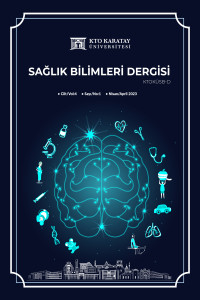Öz
Doğum, kadının hayatında güçlü psikolojik etkilere sahip önemli bir olay olarak kabul edilmekte ve doğum süreci her kadın ve ailesi tarafından içinde bulundukları kültürel özellikler doğrultusunda farklı deneyimlenmektedir. Bu süreçte özellikle ailenin iyilik halinin korunması için travmatik doğumla ilgili faktörlerin belirlenmesi ve sonuçlarının çözümlenmesi son derece önemlidir. Doğum anne için travmatik olabildiği gibi, anne veya bebeğin tehlikede olduğunu algıladığında baba için de potansiyel olarak travmatik yaşanabilmektedir. Ancak doğumda daha çok annenin yaşadığı deneyimlere odaklanılırken babanın ruh sağlığı göz ardı edilebilmektedir. Bu bağlamda yapılan derleme çalışmasının amacı, travmatik doğumla ilgili babaların deneyimlerini araştıran çalışmaları inceleyerek babaların doğumu travmatik olarak algılama nedenleri ve travmatik doğuma yaklaşımlarını ortaya koymaktır. Ayrıca doğumun babalar için nasıl daha az travmatik olabileceği ile ilgili uygulamaları sağlık profesyonellerinin rolleri çerçevesinde tartışmaktır.
Anahtar Kelimeler
Kaynakça
- Alcorn, K. L., O'Donovan, A., Patrick, J. C., Creedy, D., & Devilly, G. J. (2010). A prospective longitudinal study of the prevalence of post-traumatic stress disorder resulting from childbirth events. Psychological medicine, 40(11), 1849-1859. https://doi.org/10.1017/S0033291709992224
- American Psychiatric Association. (2013). Diagnostic and statistical manual of mental disorders (5th ed.). Arlington, VA: Author. https://doi.org/10.1176/appi.books.9780890425596
- Beck, C. T. (2015). Middle range theory of traumatic childbirth: The ever-widening ripple effect. Global Qualitative Nursing Research, 2, 2333393615575313. https://doi.org/10.1177/2333393615575313
- Benjet, C., Bromet, E., Karam, E. G., Kessler, R. C., McLaughlin, K. A., Ruscio, A. M., ... & Koenen, K. C. (2016). The epidemiology of traumatic event exposure worldwide: results from the World Mental Health Survey Consortium. Psychological medicine, 46(2), 327-343. https://doi.org/10.1017/S0033291715001981
- Bradley, R., & Slade, P. (2011). A review of mental health problems in fathers following the birth of a child. Journal of reproductive and infant psychology, 29(1), 19-42. https://doi.org/10.1080/02646838.2010.513047
- Bradley, R., Slade, P., & Leviston, A. (2008). Low rates of PTSD in men attending childbirth: a preliminary study. British Journal of Clinical Psychology, 47(3), 295-302. https://doi.org/10.1348/014466508X279495
- Brown, A., Nielsen, J. D. J., Russon, K., Ayers, S., & Webb, R. (2021). The journey towards resilience following a traumatic birth: a grounded theory. Midwifery, 103204. https://doi.org/10.1016/j.midw.2021.103204
- Dilcen, H. Y., Ekti, R. (2019). Travmatik doğumun önlenmesinde ebenin rolü. Life Sciences, 14(3), 64-73. https://dergipark.org.tr/en/pub/nwsals/issue/46928/530496
- Etheridge, J., & Slade, P. (2017). “Nothing’s actually happened to me.”: the experiences of fathers who found childbirth traumatic. BMC pregnancy and childbirth, 17(1), 1-15. https://doi.org/10.1186/s12884-017-1259-y
- Ghanbari-Homayi, S., Fardiazar, Z., Meedya, S., Mohammad-Alizadeh-Charandabi, S., Asghari-Jafarabadi, M., Mohammadi, E., & Mirghafourvand, M. (2019). Predictors of traumatic birth experience among a group of Iranian primipara women: a cross sectional study. BMC pregnancy and childbirth, 19(1), 1-9. https://doi.org/10.1186/s12884-019-2333-4
- Greenfield, M., Jomeen, J., & Glover, L. (2016). What is traumatic birth? A concept analysis and literature review. British Journal of Midwifery, 24(4), 254-267. https://doi.org/10.12968/bjom.2016.24.4.254
- Henriksen, L., Grimsrud, E., Schei, B., Lukasse, M., & Bidens Study Group. (2017). Factors related to a negative birth experience–a mixed methods study. Midwifery, 51, 33-39. https://doi.org/10.1016/j.midw.2017.05.004
- Howarth, A. M., Scott, K. M., & Swain, N. R. (2019). First-time fathers’ perception of their childbirth experiences. Journal of health psychology, 24(7), 929-940. https://doi.org/10.1177/1359105316687628
- Inglis, C., Sharman, R., & Reed, R. (2016). Paternal mental health following perceived traumatic childbirth. Midwifery, 41, 125-131. https://doi.org/10.1016/j.midw.2016.08.008
- Johansson, M., Benderix, Y., & Svensson, I. (2020). Mothers’ and fathers’ lived experiences of postpartum depression and parental stress after childbirth: a qualitative study. International journal of qualitative studies on health and well-being, 15(1), 1722564. https://doi.org/10.1080/17482631.2020.1722564
- Kress, V., von Soest, T., Kopp, M., Wimberger, P., & Garthus-Niegel, S. (2021). Differential predictors of birth-related posttraumatic stress disorder symptoms in mothers and fathers–A longitudinal cohort study. Journal of affective disorders, 292, 121-130. https://doi.org/10.1016/j.jad.2021.05.058
- McKelvin, G., Thomson, G., & Downe, S. (2021). The childbirth experience: A systematic review of predictors and outcomes. Women and Birth, 34(5), 407-416. https://doi.org/10.1016/j.wombi.2020.09.021
- Nystedt, A., & Hildingsson, I. (2018). Women’s and men’s negative experience of child birth—A cross-sectional survey. Women and Birth, 31(2), 103-109. https://doi.org/10.1016/j.wombi.2017.07.002
- Schobinger, E., Stuijfzand, S., & Horsch, A. (2020). Acute and Post-traumatic Stress Disorder Symptoms in Mothers and Fathers Following Childbirth: A Prospective Cohort Study. Frontiers in Psychiatry, 11, 1502. https://doi.org/10.3389/fpsyt.2020.562054
- Thomson, G., Diop, M. Q., Stuijfzand, S., & Horsch, A. (2021). Policy, service, and training provision for women following a traumatic birth: an international knowledge mapping exercise. BMC health services research, 21(1), 1-10. https://doi.org/10.1186/s12913-021-07238-x
- Vallin, E., Nestander, H., & Wells, M. B. (2019). A literature review and meta-ethnography of fathers’ psychological health and received social support during unpredictable complicated childbirths. Midwifery, 68, 48-55. https://doi.org/10.1016/j.midw.2018.10.007
- Van Steijn, M. E., Scheepstra, K. W., Zaat, T. R., Van der Post, J. A., Olff, M., & Van Pampus, M. G. (2020). Posttraumatic stress disorder in partners following severe postpartum haemorrhage: A prospective cohort study. Women and Birth, 33(4), 360-366. https://doi.org/10.1016/j.wombi.2019.06.016
- White, G. (2007). You cope by breaking down in private: fathers and PTSD following childbirth. British Journal of Midwifery, 15(1), 39-45. https://doi.org/10.12968/bjom.2007.15.1.22679
- Yıldırım, G., & Bilgin, Z. (2021). Risk status and traumatic birth perception in pregnancy. Perspectives in Psychiatric Care, 57(4), 1897-1904. https://doi.org/10.1111/ppc.12764
- Yılmaz, B., Sel, İ., Şahin, N. H. (2021). Kadınların Kişilik Özelliklerinin Travmatik Doğum Algısına Etkisi. Dokuz Eylül Üniversitesi Hemşirelik Fakültesi Elektronik Dergisi, 14(4), 423-432. https://doi.org/10.46483/deuhfed.882663
Ayrıntılar
| Birincil Dil | Türkçe |
|---|---|
| Konular | Kadın Hastalıkları ve Doğum, Sağlık Kurumları Yönetimi |
| Bölüm | Derleme |
| Yazarlar | |
| Yayımlanma Tarihi | 28 Nisan 2023 |
| Gönderilme Tarihi | 19 Ağustos 2022 |
| Kabul Tarihi | 6 Ocak 2023 |
| Yayımlandığı Sayı | Yıl 2023 Cilt: 4 Sayı: 1 |


